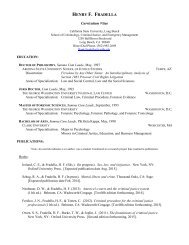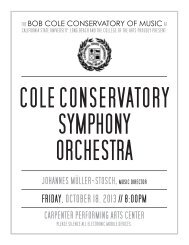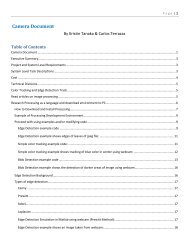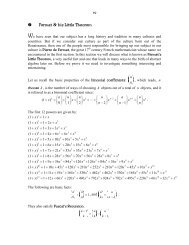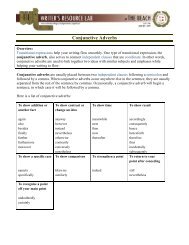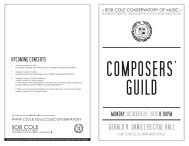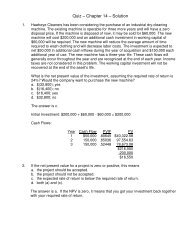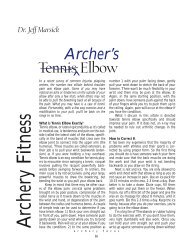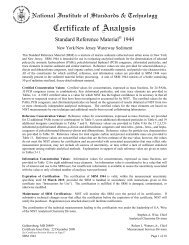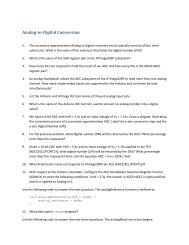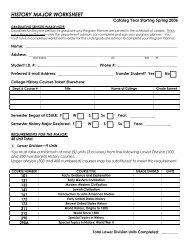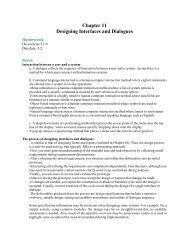Untitled - California State University, Long Beach
Untitled - California State University, Long Beach
Untitled - California State University, Long Beach
You also want an ePaper? Increase the reach of your titles
YUMPU automatically turns print PDFs into web optimized ePapers that Google loves.
way, for instance, notoriously did not include dialogue-tags in much of<br />
his fiction. Foer takes this unattributed quoting to new heights. He employs<br />
vast paragraphs of dialogue in which quotes are often not separated<br />
by anything more than a period, and often do not have Alex’s narrative<br />
interjections between them to give us clues as to who is saying what. Still,<br />
because of Alex’s strange Ukrainian-American English his voice is unique<br />
enough that it can usually be distinguished from Jonathan’s. Instances<br />
where Alex’s voice is distinguishable or indistinguishable from Jonathan’s<br />
can be found in any of Alex’s journey narrative chapters, such as one of<br />
his earlier ones entitled “Going Forth to Lutsk.” Throughout most of this<br />
chapter, if the reader pays close attention it is easy enough to distinguish<br />
who is saying what, such as in this passage:<br />
“Do you have motorcycles in America?” “Of course.” “And<br />
fax machines?” “Everywhere.” “You have a fax machine?” “No<br />
they’re very passé.” “What does it mean passé?” “They’re out-ofdate.<br />
Paper is so tedious.” “Tedious?” “Tiresome.” “I understand<br />
what you are telling me, and I harmonize. I would not ever use<br />
paper. It makes me a sleeping person.” (Foer 71).<br />
Alex is easily identified in the section as the speaker who asks, “Do you<br />
have motorcycles in America?” and whose quotations occur every other<br />
sentence afterwards. Obviously, we can discern that this is Alex because<br />
he has never been to America, and that the other speaker is Jonathan, because<br />
he is the American. In terms of voice, however, Alex’s voice is quite<br />
distinctive because of his unique brand of American English. The phrase,<br />
“I harmonize,” for instance, is not something that any American would<br />
typically say. If it were Jonathan, he would have responded, “I agree.”<br />
Also signifying that the first speaker is Alex is his questioning of the word<br />
“tedious,” as he so often does when he does not understand a word or<br />
phrase Jonathan utters.<br />
“Going Forth to Lutsk” also contains examples of the confusion this<br />
34 | Mehlinger<br />
un-tagged, mashed-together way of writing dialogue can cause Jonathan’s<br />
and Alex’s voices to become visually indistinguishable. It is relatively<br />
simple to distinguish between Jonathan’s and Alex’s voices in the previous<br />
section because the quoted text is only a small portion of a larger<br />
paragraph. In this particular paragraph, as in others, there are no dialogue<br />
tags except at the very beginning of the paragraph when Alex writes, “‘A<br />
question,’ I said” (Foer 71). Similarly, in a large paragraph earlier in the<br />
chapter, Alex includes only one dialogue tag at the beginning of the paragraph:<br />
“‘I want to see Trachimbrod,’ the hero said” (59). Visually, looking<br />
at this immense chunk of un-separated, untagged dialogue makes it difficult<br />
to distinguish between who is speaking unless the reader pays close<br />
attention. Speed-reading certainly would not work here. If one’s attention<br />
is wandering, it would be easy to confuse which of the two characters is<br />
speaking, because Alex’s voice parrots back much of what Jonathan says<br />
to him, as in this small segment: “‘And the shtetls weren’t only Jews, so<br />
there should be others to talk to.’ ‘The whats?’ ‘Shtetls. A shtetl is like a<br />
village.’ ‘Why don’t you merely dub it a village?’ ‘It’s a Jewish word.’ ‘A<br />
Jewish word?’ ‘Yiddish. Like schmuck.’ ‘What does it mean schmuck?’”<br />
(60). Nearly every time Jonathan mentions a word, Alex repeats it, as<br />
though he is experimenting to see how Jonathan’s foreign words work<br />
but putting them in his own mouth. Alex repeats the words and phrases,<br />
“Jewish word,” “village,” and “schmuck.” As our eye’s skim over the words<br />
they run together, catching these repeated phrases. Without dialogue tags<br />
to guide us in this sea of text, these large chunks of dialogue must be read<br />
carefully in order to figure out who is speaking. Mingling Alex’s and Jonathan’s<br />
voices together like this is another way Foer attempts to intertwine<br />
the voices of these two character-narrators.<br />
By creating a complex narrative structure in which Alex’s and Jonathan’s<br />
voices affect and change one another, and in which Alex’s narrative<br />
power seems to outweigh the supposed “hero” and creator of the book,<br />
Mehlinger | 35



